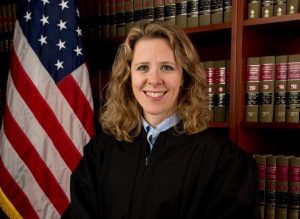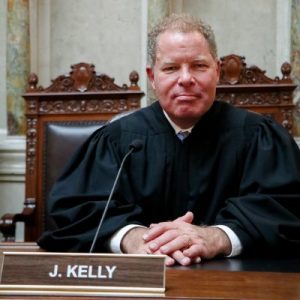 On March 22, 2020, the Wisconsin Supreme Court suspended jury trials throughout the state in response to the corona virus pandemic. Justice Rebecca Bradley, joined by Justice Daniel Kelly filed a vigorous dissent explaining how the court overstepped its authority in issuing the order and that emergencies do not grant government any greater power than found in the Constitution. Justice Bradley’s arguments apply with equal force to all branches of government.
On March 22, 2020, the Wisconsin Supreme Court suspended jury trials throughout the state in response to the corona virus pandemic. Justice Rebecca Bradley, joined by Justice Daniel Kelly filed a vigorous dissent explaining how the court overstepped its authority in issuing the order and that emergencies do not grant government any greater power than found in the Constitution. Justice Bradley’s arguments apply with equal force to all branches of government.
Justice Bradley eloquently illuminates the principle in Constitution and Corona Virus: there are no emergency exceptions to the Bill of Rights.
Her dissent follows. The underlining and emphasis are hers, links to references are added.
¶1 REBECCA GRASSL BRADLEY, J. (dissenting). The Wisconsin Supreme Court suspends the constitutional rights of Wisconsin citizens, citing the exigency of a public health emergency. The Constitution does not countenance such an infringement. “Emergency does not create power. Emergency does not increase granted power or remove or diminish the restrictions imposed upon power granted or reserved. The Constitution was adopted in a period of grave emergency. Its grants of power to the federal government and its limitations of the power of the States were determined in the light of emergency, and they are not altered by emergency.” Home Bldg. & Loan Ass’n v. Blaisdell, 290 U.S. 398, 425 (1934) (emphasis added).
¶2 The Sixth Amendment to the United States Constitution commands: “In all criminal prosecutions, the accused shall enjoy the right to a speedy trial[.]” U.S. Const. amend. VI. Wisconsin’s highest court says a public health emergency justifies a blanket 60-day suspension of a constitutional right. If that is true, then the following constitutionally enumerated rights of the people (among others) are also subject to suspension by judicial decree:
- The free exercise of religion
- The freedom of speech
- The freedom of the press
- The right of the people to peaceably assemble
- The right of the people to petition the Government for a redress of grievances
- The right of the people to keep and bear Arms
- The right of the people to be secure in their persons, houses, papers and effects, against unreasonable searches and seizures.
¶3 Informed by the lessons of history, the Constitution was established to safeguard the rights of the people even under the most exigent circumstances. The framers “foresaw that troublous times would arise, when rulers and people would become restive under restraint, and seek by sharp and decisive measures to accomplish ends deemed just and proper; and that the principles of constitutional liberty would be in peril, unless established by irrepealable law. The history of the world had taught them that what was done in the past might be attempted in the future. The Constitution of the United States is a law for rulers and people, equally in war and in peace, and covers with the shield of its protection all classes of men, at all times, and under all circumstances. No doctrine, involving more pernicious consequences, was ever invented by the wit of man than that any of its provisions can be suspended during any of the great exigencies of government. Such a doctrine leads directly to anarchy or despotism, but the theory of necessity on which it is based is false; for the government, within the Constitution, has all the powers granted to it, which are necessary to preserve its existence; as has been happily proved by the result of the great effort to throw off its just authority. Ex parte Milligan, 71 U.S. 2, 120-21 (1866) (emphasis added).
¶4 The Sixth Amendment’s Speedy Trial Clause enshrines an ancient liberty. The Assize of Clarendon, an English code of legal procedure established in 1166, mandated speedy trials for the accused, “without delay.” In 1215, following the English barons’ revolt against tyrannical rule, the Magna Carta promised “[t]o no one will we sell, to no one deny or delay the right or justice.” See Patrick Ellard, Learning From Katrina: Emphasizing the Right to a Speedy Trial to Protect Constitutional Guarantees in Disasters, 44 Am. Crim. L. Rev. 1207, 1209-10 (2007) (quoted source omitted).
¶5 The right to a “trial by jury” is “a valuable safeguard to liberty” and “the very palladium of free government.” The Federalist No. 83, at 499 (Alexander Hamilton) (Clinton Rossiter ed., 1961). “[T]he Speedy Trial Clause’s core concern is impairment of liberty.” Doggett v. United States, 505 U.S. 647, 660 (1992) (Thomas, J., dissenting) (quoting United States v. Loud Hawk, 474 U.S. 302, 312 (1986)). “The public interest in a broad sense, as well as the constitutional guarantee, commands prompt disposition of criminal charges.” Strunk v. United States, 412 U.S. 434, 439 n.2 (1973). With respect to the rights guaranteed by the Sixth Amendment, “so strong was the sense of the country of their importance, and so jealous were the people that these rights, highly prized, might be denied them by implication, that when the original Constitution was proposed for adoption it encountered severe opposition; and, but for the belief that it would be so amended as to embrace them, it would never have been ratified.” Ex parte Milligan, 71 U.S. at 120. “Time has proven the discernment of our ancestors; for even these provisions, expressed in such plain English words that it would seem the ingenuity of man could not evade them, are now . . . sought to be avoided.” Id. (emphasis added; emphasis omitted).
¶6 Nothing in the Constitution permits the judiciary to limit the fundamental rights secured under the Sixth Amendment. “[T]here is only one instance in the Constitution where the government is expressly permitted to suspend a fundamental right[.]” Mitchell F. Crusto, State of Emergency: An Emergency Constitution Revisited, 61 Loy. L. Rev. 471, 504 & n.189 (2015); see U.S. Const. art I., § 9, cl. 2. Article I. § 9, cl. 2 provides: “The Privilege of the Writ of Habeas Corpus shall not be suspended, unless when in Cases of Rebellion or Invasion the public Safety may require it.” If the framers had contemplated suspension of Sixth Amendment rights or any other liberties, they would have said so in the text.
¶7 The court’s order not only overrides the United States Constitution, it flouts the Wisconsin Constitution, which mandates: “In all criminal prosecutions, the accused shall enjoy the right . . . to a speedy public trial[.]” Wis. Const. Art. I, § 7. While utterly ignoring the supreme law of the land, the court expressly refuses to follow statutory law. The court says “the ends of justice served by temporarily suspending jury trials in the courts of this state outweigh the interest of the public and the defendant in a speedy trial under Wis. Stat. sec. 971.10(3)(a).” Under that statute, criminal trials in Wisconsin “shall commence” within specified periods of time, depending on the nature of the charges. See Wis. Stat. § 971.10(1)-(2). Continuances are statutorily permissible, provided a circuit court considers multiple case-specific factors. See Wis. Stat. § 971.10(3). The broad sweep of the court’s order precludes every circuit court in the state from exercising its discretionary power to weigh various statutory factors——including the interests of the victim——before granting a continuance. See Wis. Stat. § 971.10(3)(b)(3).
¶8 The all-encompassing nature of the court’s order postponing every criminal jury trial in the state of Wisconsin for a minimum of two months cannot comport with the Sixth Amendment’s speedy trial mandate, which, although not strictly construed so as to forbid any delay whatsoever, “necessarily compels courts to approach speedy trial cases on an ad hoc basis. We can do little more than identify some of the factors which courts should assess in determining whether a particular defendant has been deprived of his right. Though some might express them in different ways, we identify four such factors: Length of delay, the reason for the delay, the defendant’s assertion of his right, and prejudice to the defendant.” Barker v. Wingo, 407 U.S. 514, 530 (1972) (emphasis added; footnote omitted). The court’s blanket order dispenses with both constitutional and statutory requirements to consider, on a case by case basis, the rights of the accused, the interests of victims, and the best interests of the public. Under Wisconsin law, “[e]very defendant not tried in accordance with this section shall be discharged from custody.” Wis. Stat. § 971.10(4). Violations of the Constitution’s Speedy Trial Clause require dismissal of the charges against the accused: “In light of the policies which underlie the right to a speedy trial, dismissal must remain, as Barker noted, ‘the only possible remedy.'” Strunk, 412 U.S. at 440 (citing Barker, 407 U.S. at 522).
 ¶9 “History teaches that grave threats to liberty often come in times of urgency, when constitutional rights seem too extravagant to endure . . . when we allow fundamental freedoms to be sacrificed in the name of real or perceived exigency, we invariably come to regret it.” Skinner v. Railway Labor Executives’ Ass’n, 489 U.S. 602, 635 (1989) (Marshall, J., dissenting). Justifying the suspension of the people’s constitutionally guaranteed rights based on a public health emergency nullifies our Constitution. Justice Antonin Scalia once explained that “every tinpot dictator has a Bill of Rights which he casually ignores. What was debated in 1787 and what insures our freedom is our structure of government which holds each branch (and in turn by its people) to account.” If the people’s constitutional rights may be suspended by the judicial branch in the name of a public health emergency, our freedom is in peril; our republic is lost. More than one million Americans have died defending our liberty from external threats. The liberty for which so many have laid down their lives should not be cast aside even in “troublous times.” If the government will not protect constitutional rights designed to preserve our freedom, it is up to the people to reclaim them.
¶9 “History teaches that grave threats to liberty often come in times of urgency, when constitutional rights seem too extravagant to endure . . . when we allow fundamental freedoms to be sacrificed in the name of real or perceived exigency, we invariably come to regret it.” Skinner v. Railway Labor Executives’ Ass’n, 489 U.S. 602, 635 (1989) (Marshall, J., dissenting). Justifying the suspension of the people’s constitutionally guaranteed rights based on a public health emergency nullifies our Constitution. Justice Antonin Scalia once explained that “every tinpot dictator has a Bill of Rights which he casually ignores. What was debated in 1787 and what insures our freedom is our structure of government which holds each branch (and in turn by its people) to account.” If the people’s constitutional rights may be suspended by the judicial branch in the name of a public health emergency, our freedom is in peril; our republic is lost. More than one million Americans have died defending our liberty from external threats. The liberty for which so many have laid down their lives should not be cast aside even in “troublous times.” If the government will not protect constitutional rights designed to preserve our freedom, it is up to the people to reclaim them.
¶10 I am authorized to state that Justice Daniel Kelly joins this dissent.






[…] “If the government will not protect constitutional rights designed to preserve our freedom, it is up to the people to reclaim them.” Wisconsin Supreme Court Justice Rebecca Bradley […]